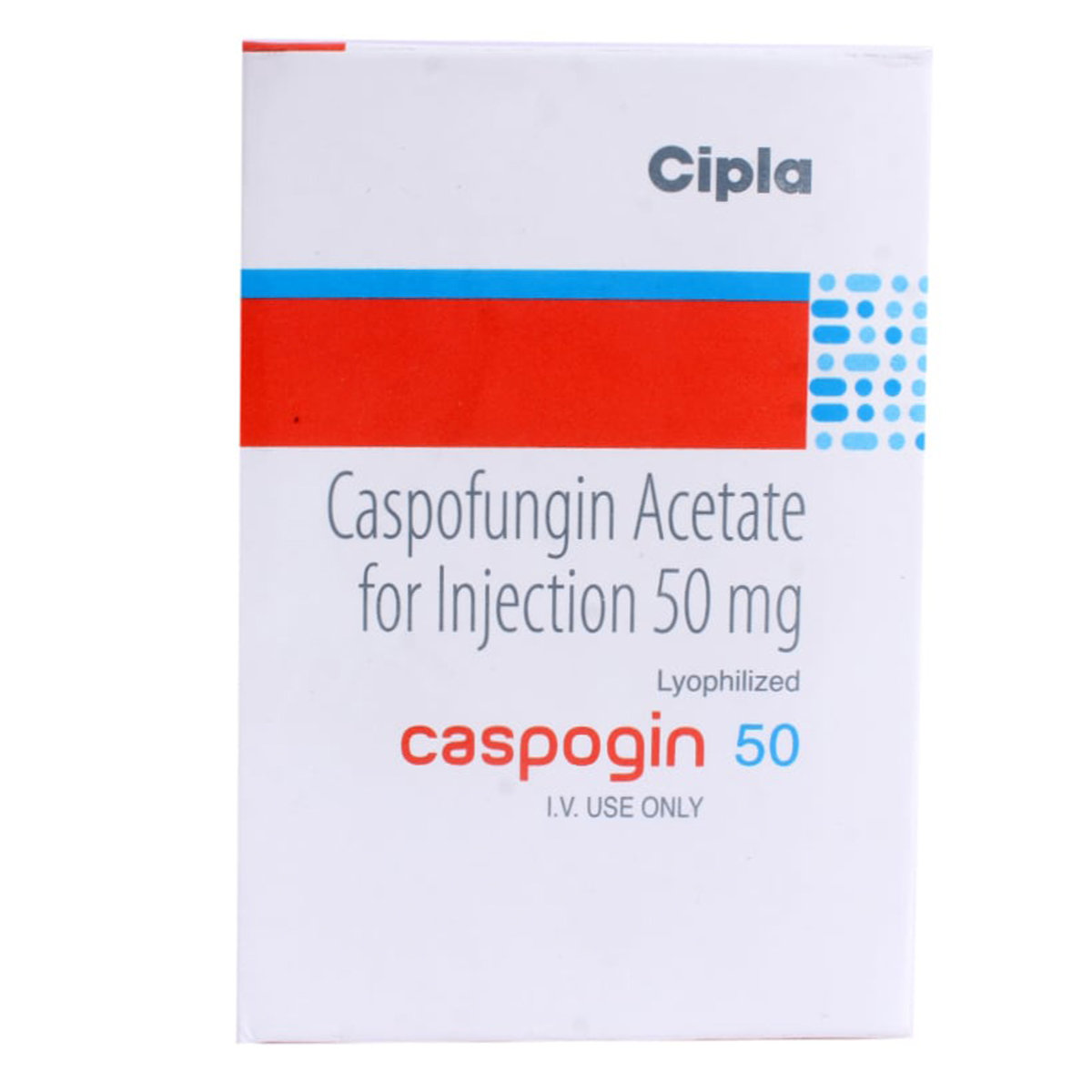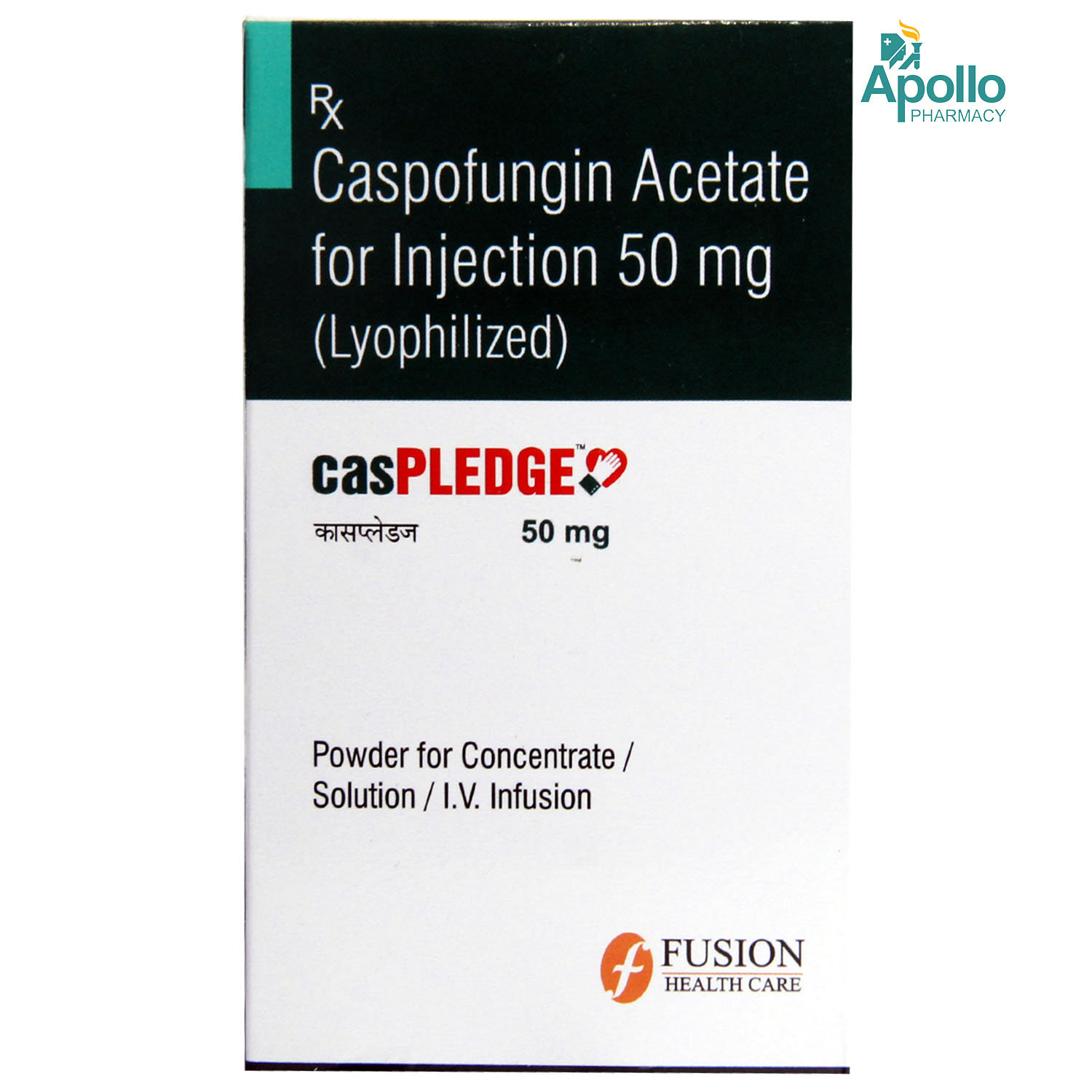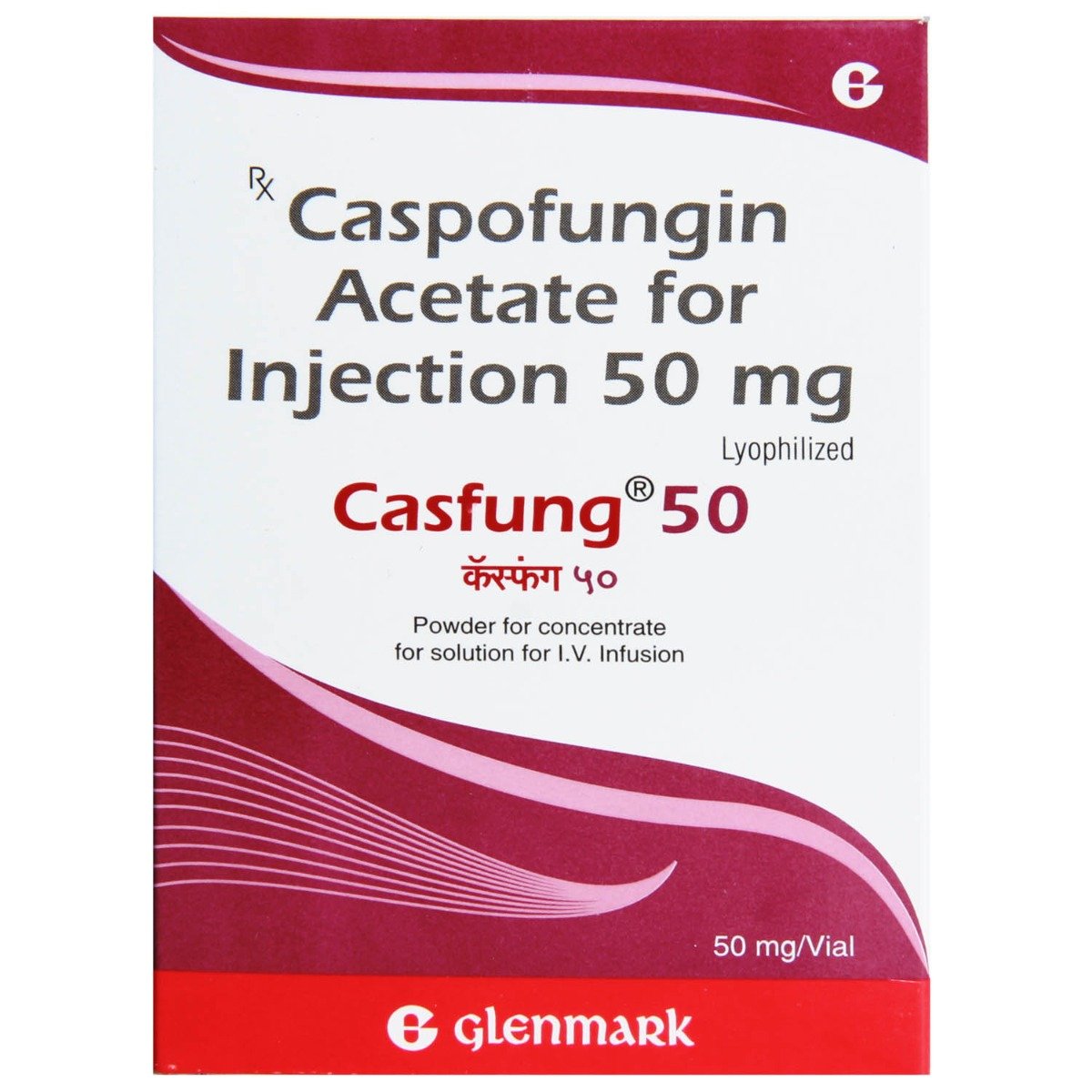Guficap 50Mg Injection
MRP ₹5270
(Inclusive of all Taxes)
₹790.5 Cashback (15%)
Provide Delivery Location
Online payment accepted
 Prescription drug
Prescription drugWhats That
Composition :
Manufacturer/Marketer :
Consume Type :
Expires on or after :
Return Policy :
About Guficap 50Mg Injection
Guficap 50Mg Injection belongs to the class of medicines known as 'antifungals' used to treat various fungal infections. A fungal infection is caused when a fungus invades and affects any body part.
Guficap 50Mg Injection contains Caspofungin, which inhibits the formation of a fungal cell wall component required for the fungus to continue living and growing. When fungal cells are exposed to Caspofungin, their cell walls become partial or faulty, making them fragile and unable to grow. As a result, fungal cells get killed, or their growth is minimized.
A qualified healthcare professional will administer Guficap 50Mg Injection. In some cases, you may experience certain common side effects, such as injection site reactions, headaches, dizziness, nausea, vomiting, diarrhoea, stomach pain, tremors, sweating, high blood pressure, difficulty sleeping and swelling of the hands, ankles, or feet. Most of these side effects do not require medical attention and will resolve gradually over time. However, you are advised to talk to your doctor if you experience these side effects persistently.
Before taking Guficap 50Mg Injection, inform your doctor about your medical condition, sensitivities, and medications. Inform your doctor if you are pregnant, planning to become pregnant, or breastfeeding. Do not use any other medicines with Guficap 50Mg Injection without a doctor's recommendation. Guficap 50Mg Injection may cause dizziness; therefore, avoid driving vehicles or operating machinery until you return to normal. Avoid the consumption of alcohol while on Caspofungin therapy.
Uses of Guficap 50Mg Injection
Directions for Use
Key Benefits
Guficap 50Mg Injection is an antifungal agent, a medicine used to treat several fungal infections. It can be used to treat fungal infections that other drugs have failed to treat. It is also used to treat serious fungal infections in persons who have a reduced immune system. Guficap 50Mg Injection works by killing or preventing fungi or yeast by inhibiting an enzyme in fungi responsible for its membrane formation. As a result, fungal cells get killed, or their growth is minimized.
Storage
- Rest well; get enough sleep.
- Wear comfortable layers of clothes and get to a warm place.
- Drink warm fluids like coffee, tea or hot chocolate.
- Warm up using a blanket or heating pad.
- Inform your doctor immediately if you experience a fever after starting a new medication.
- Your doctor may adjust your medication regimen or dosage as needed to minimize fever symptoms.
- Monitor your body temperature to monitor fever progression.
- Drink plenty of fluids, such as water or electrolyte-rich beverages, to help your body regulate temperature.
- Get plenty of rest and engage in relaxation techniques, such as deep breathing or meditation, to help manage fever symptoms.
- Under the guidance of your doctor, consider taking medication, such as acetaminophen or ibuprofen, to help reduce fever.
- If your fever is extremely high (over 103°F), or if you experience severe symptoms such as confusion, seizures, or difficulty breathing, seek immediate medical attention.
- Contact your doctor immediately if you're experiencing a fast heart rate, palpitations, or other heart-related symptoms. This is crucial to determine whether the symptoms are related to your medication.
- Your doctor may need to adjust your medication regimen to alleviate the fast heart rate symptoms. This could involve changing the medication, reducing the dosage, or adding new medications to counteract the side effects.
- Follow your doctor's advice on monitoring your heart rate and blood pressure. This will help track any changes and ensure your heart rate returns normal.
- If you experience severe symptoms such as chest pain, dizziness, or shortness of breath, seek immediate medical attention. These symptoms can indicate a more serious condition that requires prompt treatment.
- Inform Your Doctor: Notify your doctor immediately about your diarrhoea symptoms. This allows them to adjust your medication or provide guidance on managing side effects.
- Stay Hydrated: Drink plenty of fluids to replace lost water and electrolytes. Choose water, clear broth, and electrolyte-rich drinks. Avoid carbonated or caffeinated beverages to effectively rehydrate your body.
- Follow a Bland Diet: Eat easy-to-digest foods to help firm up your stool and settle your stomach. Try incorporating bananas, rice, applesauce, toast, plain crackers, and boiled vegetables into your diet.
- Avoid Trigger Foods: Steer clear of foods that can worsen diarrhoea, such as spicy, fatty, or greasy foods, high-fibre foods, and dairy products (especially if you're lactose intolerant).
- Practice Good Hygiene: Maintain good hygiene to prevent the spread of infection. To stay healthy, wash your hands frequently, clean and disinfect surfaces regularly, and avoid exchanging personal belongings with others.
- Take Anti-Diarrheal Medications: If your doctor advises, anti-diarrheal medications such as loperamide might help manage diarrhoea symptoms. Always follow your doctor's directions.
- Keep track of your diarrhoea symptoms. If they don't get better or worse or are accompanied by severe stomach pain, blood, or dehydration signs (like extreme thirst or dark urine), seek medical help.
- Inform your doctor about the nausea and discuss possible alternatives to the medication or adjustments to the dosage.
- Divide your daily food intake into smaller, more frequent meals to reduce nausea.
- Opt for bland, easily digestible foods like crackers, toast, plain rice, bananas, and applesauce.
- Avoid certain foods that can trigger nausea, such as fatty, greasy, spicy, and smelly foods.
- Drink plenty of fluids, such as water, clear broth, or electrolyte-rich beverages like coconut water or sports drinks.
- Use ginger (tea, ale, or candies) to help relieve nausea.
- Get adequate rest and also avoid strenuous activities that can worsen nausea.
- Talk to your doctor about taking anti-nausea medication if your nausea is severe.
- Record when your nausea occurs, what triggers it, and what provides relief to help you identify patterns and manage your symptoms more effectively.
- Preventing Vomiting (Before it Happens)
- Take medication exactly as prescribed by your doctor. This can help minimize side effects, including vomiting.
- Having a small meal before taking your medication can help reduce nausea and vomiting.
- Talk to your doctor about taking anti-nausea medication along with your prescribed medication.
- Managing Vomiting (If it Happens)
- Try taking ginger in the form of tea, ale, or candy to help alleviate nausea and vomiting.
- What to Do if Vomiting Persists
- Consult your doctor if vomiting continues or worsens, consult the doctor for guidance on adjusting your medication or additional treatment.
- Hydrate your body: Drink enough water to prevent dehydration and headaches.
- Calm Your Mind: Deep breathing and meditation can help you relax and relieve stress.
- Rest and Recharge: Sleep for 7-8 hours to reduce headache triggers.
- Take rest: lie down in a quiet, dark environment.
- Cold or warm compresses can help reduce tension.
- Stay Upright: Maintain good posture to keep symptoms from getting worse.
- To treat headaches naturally, try acupuncture or massage therapy.
- Over-the-counter pain relievers include acetaminophen and ibuprofen.
- Prescription Assistance: Speak with your doctor about more substantial drug alternatives.
- Severe Headaches: Seek emergency medical assistance for sudden, severe headaches.
- Frequent Headaches: If you get reoccurring headaches, consult your doctor.
- Headaches with Symptoms: Seek medical attention if your headaches include fever, disorientation, or weakness.
Drug Warnings
It is recommended not to use Guficap 50Mg Injection if you are allergic to any component present, so inform your doctor about your sensitivities with medicines and foods. Also, let your doctor know about your medical condition and the medications you are currently using. Do not use any other drugs with Guficap 50Mg Injection without a doctor’s recommendation. Tell your doctor if you are pregnant, planning to become pregnant, or breastfeeding.
Drug-Drug Interactions
Drug-Drug Interactions
Login/Sign Up
Co-administration of Dexamethasone with Guficap 50Mg Injection may cause Guficap 50Mg Injection to be less effective.
How to manage the interaction:
Although there is a possible interaction between Guficap 50Mg Injection and Dexamethasone, you can take these medicines together if prescribed by a doctor. Do not discontinue any medications without consulting a doctor.
Coadministration of ketoconazole with Guficap 50Mg Injection may raise the risk of liver damage.
How to manage the interaction:
Although taking Ketoconazole and Guficap 50Mg Injection together can result in an interaction, it can be taken if a doctor has prescribed it. However, if you have any of the following symptoms: fever, chills, joint pain or swelling, unusual bleeding or bruising, skin rash, itching, fatigue, lack of appetite, nausea, vomiting, abdominal pain, dark urine, light stools, and/or yellowing of the skin or eyes, consult a doctor. Do not discontinue any medication without consulting a doctor.
Taking Rifampicin in combination with Guficap 50Mg Injection may make Guficap 50Mg Injection less effective.
How to manage the interaction:
There may be a possibility of interaction between Guficap 50Mg Injection and Rifampicin, but it can be taken if prescribed by a doctor. Contact your doctor if your symptoms do not improve. Do not stop using any medications without first talking to your doctor.
Coadministration of Phenytoin and Guficap 50Mg Injection may decrease the blood levels of Guficap 50Mg Injection, which may make Guficap 50Mg Injection less effective.
How to manage the interaction:
Although taking Phenytoin and Guficap 50Mg Injection together can result in an interaction, it can be taken if your doctor has prescribed it. If your infection gets worse or if your symptoms don't go away, it is advised to consult a doctor. Without consulting a doctor, never stop taking any drugs.
Taking Guficap 50Mg Injection and Efavirenz together reduces the levels and effectiveness of Guficap 50Mg Injection.
How to manage the interaction:
Although taking Guficap 50Mg Injection and Efavirenz together can evidently cause an interaction, it can be taken if your doctor has suggested it. Do not stop using any medications without a doctor's advice.
Leflunomide can cause liver problems, and combining it with other drugs, such as binimetinib, can raise the risk.
How to manage the interaction:
There may be a possibility of interaction between Leflunomide and Guficap 50Mg Injection, but it can be taken if prescribed by a doctor. If you have any of these symptoms, contact your doctor right away. These symptoms include liver problems, fever, rash, itching, loss of appetite, dark urine, stomach pain, unusual bleeding or bruising, feeling tired, and yellowing of the skin or eyes. Do not stop using any medications without a doctor's advice.
Coadministration of Guficap 50Mg Injection and Fosphenytoin can reduce the levels of Guficap 50Mg Injection in the body. This can lead to low treatment outcomes.
How to manage the interaction:
Although there is a possible interaction between Guficap 50Mg Injection and Fosphenytoin, you can take these medicines together if prescribed by your doctor. Do not stop using any medications without first talking to your doctor.
Using nevirapine together with Guficap 50Mg Injection may cause Guficap 50Mg Injection to be less effective.
How to manage the interaction:
Although there is a possible interaction between Guficap 50Mg Injection and Nevirapine, you can take these medicines together if prescribed by a doctor. Do not stop using any medications without a doctor's advice.
Taking carbamazepine and Guficap 50Mg Injection together may result in decreasing the effects of Guficap 50Mg Injection.
How to manage the interaction:
Although taking carbamazepine and Guficap 50Mg Injection together can possibly result in an interaction, it can be taken if your doctor has advised it. However, if you experience any unusual symptoms contact your doctor immediately. Do not stop using any medications without first talking to your doctor.
Drug-Food Interactions
Drug-Food Interactions
Login/Sign Up
Diet & Lifestyle Advise
- It is advisable to follow a candida diet during fungal infections. This diet excludes sugar, gluten, certain dairy products, and alcohol. Switch to low-sugar fruits, non-starchy vegetables and gluten-free foods. A very high sugar or high-carbohydrate diet may increase the count of Candida in some people.
- Create a well-balanced and healthy diet that includes vegetables, fruits, whole grains, legumes, omega-3-rich foods, and lean protein sources.
- Limit or avoid alcohol consumption.
- Quitting smoking is the best strategy to lower the risk of any disease.
- Avoid sharing towels, combs, bedsheets, shoes or socks with others.
- Wash your bedsheets and towels regularly.
Side Effects of Guficap 50Mg Injection
- Injection site reactions
- Headache
- Dizziness
- Chills
- Nausea
- Vomiting
- Diarrhoea
- Stomach pain
- Flushing
- Tremor
- Sweating
- High blood pressure
- Muscle ache,
- Joint or bone pain
- Difficulty sleeping
- Swelling of the hands, ankles, or feet
Habit Forming
Therapeutic Class
All Substitutes & Brand Comparisons
RX
Out of StockCaspoeva 50 Injection 1's
CONCORD DRUGS LTD
₹4499
(₹3689.18 per unit)
14% CHEAPERRX
Caspogin 50 mg Injection 1's
Cipla Ltd
₹4620
(₹3788.4 per unit)
12% CHEAPERRX
Caspledge 50mg Injection
Fusion Health Care Pvt Ltd
₹4999
(₹4099.2 per unit)
5% CHEAPER
Author Details
We provide you with authentic, trustworthy and relevant information
Drug-Diseases Interactions
Drug-Diseases Interactions
Login/Sign Up
FAQs
Drug-Drug Interactions Checker List
- KETOCONAZOLE
- CARBAMAZEPINE
- PHENYTOIN
- EFAVIRENZ
- NELFINAVIR
Disease/Condition Glossary
Fungal infections: Fungal infection occurs when a fungus enters, infects and multiplies in the body. Fungi can live in water, soil, air and plants. Fungi affect any body part, including the mouth, throat, oesophagus, lungs, bladder, genital area and blood. Mild fungal skin infections are common and can cause rashes. Fungal infections affecting body organs like the lungs can cause flu or tuberculosis. Some fungal diseases like cryptococcal meningitis and blood infections can be fatal. A few common fungal infections are yeast infections that affect the genital area, oesophagus and urinary tract caused by Candida.

Have a query?
Alcohol
Safe if prescribed
Avoiding alcohol is recommended to rule out any possibility of side effects.
Pregnancy
Consult your doctor
Guficap 50Mg Injection is generally not recommended in pregnancy. Your doctor may prescribe this medicine if the benefit to the mother outweighs the potential risk to the fetus.
Breast Feeding
Consult your doctor
If you are breastfeeding, please inform your doctor. It is not known if Guficap 50Mg Injection passes into breastmilk. Your doctor may advise you to stop breastfeeding before starting the treatment with Guficap 50Mg Injection.
Driving
Safe if prescribed
Guficap 50Mg Injection may cause dizziness; therefore, avoid driving vehicles or operating machinery until you return to normal.
Liver
Consult your doctor
Inform your doctor before receiving the Guficap 50Mg Injection if you have had a liver impairment/disorder history. Your doctor will prescribe only if the benefits outweigh the risks.
Kidney
Consult your doctor
Inform your doctor before receiving the Guficap 50Mg Injection if you have had a kidney impairment/disorder history. Your doctor will prescribe only if the benefits outweigh the risks.
Children
Safe if prescribed
Please consult your doctor. Your doctor may prescribe this medicine if the benefits outweigh the risks.















